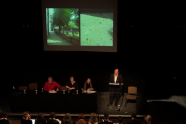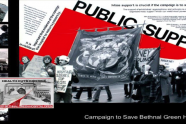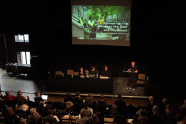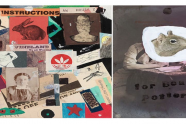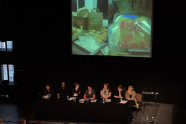Community Arts: Wendy and Bill Harpe Introducing the Black-E
Wendy and Bill Harpe Introducing the Black-E
Liverpool Biennial's annual conference Community Arts? Learning from the Legacy of Artists' Social Initiatives was held at the Black-E on Sunday 1 November 2015. The daylong event brought together distinguished thinkers and practitioners from the field of community arts to discuss the legacy of such practices in the light of a renewed interest in socially engaged art.
Co-founders of the Black-E Wendy and Bill Harpe summarise their fifty years of work in visual arts at this historic community venue.
Wendy Harpe began her career as an arts administrator, working as assistant to the Director at the Cardiff Commonwealth Arts Festival 1965. She also ran the Bluecoats Arts Forum, which promoted projects across the artforms, including bringing the first outdoor sculpture exhibition to Liverpool. She co-founded The Black-E with Bill Harpe and Peter Moores in 1968, working there full time until 1984, and on one-off projects in the years that followed. She continues to be a Trustee of the Black-E, and is currently archiving the 40-plus years of the Black-E's work. She also worked at the GLC in the 1980s, The Arts Council Of Great Britain (1990) and the BBC (1998-2006).
Bill Harpe is Director & Co-Founder of The Black-E, and also sits as Trustee. His work as an artist has focused on the arts and participation, including participatory theatre, participatory exhibitions, and creative and co-operative games. As well as directing the Commonwealth Arts Festival, he has directed four outdoor ‘Festivals of Games’ in Liverpool city centre, and has travelled around the UK and to Ireland, Denmark and Jamaica to lead and talk about games. In addition to these commitments he has written on dance and cultural issues for The Guardian and for magazines and periodicals in the UK and abroad. He also was granted a 'working sabbatical' to contribute to cultural policy and strategy at the Greater London Council. Outstanding ambitions include a desire to see the final completion of the redevelopment of the Black-E building in order to host large scale events and games, and to travel to Cuba to undertake research and to lead games.
The Black-E (formerly The Blackie) is the UK’s first community arts project, beginning with a commitment to combine a contemporary arts centre with a community centre, where all the arts (performing and making, experimental and traditional) might engage with all the people who chose to come through its doors. Having taken over the former Great George Street Congregational Church in October 1967 with the support of Peter (now Sir Peter) Moores – the team of artists led by Wendy and Bill Harpe began their cultural adventures with long term aims and with an 'open door' policy.
The proximity of the building to Britain's oldest established African-Caribbean community, and to Europe's oldest Chinatown, meant that cultural diversity would be celebrated as a natural phenomenon. The siting of the building adjoining a residential neighbourhood and yet close to the city centre meant that both residents of the city and visitors to the city would find it accessible – and that it would be natural for playgroups and community enterprises to take place alongside dance recitals and exhibitions. The fact that the founders were artists shaped an organisation where creating works became as natural as presenting and promoting works. And the balance of the staffing, with women taking a leading role from the earliest years, has meant that the organisation has evolved a natural commitment to women and the arts.
